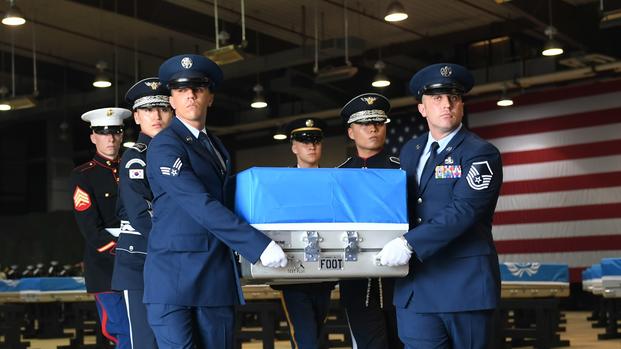"Welcome home," Vice President Mike Pence said Wednesday to begin the "honorable carry" ceremony for the return of 55 transfer cases believed to contain the remains of American service members lost in what has been called the "Forgotten War."
On the tarmac at Hickam Air Force Base, Hawaii, two Air Force C-17 Globemasters were parked tail to tail, their huge aft hatches lowered. The two aircraft earlier Wednesday had taken aboard the 55 cases, each draped in the flag of the United Nations Command, at Osan Air Base in South Korea.
Slowly, honor guards from all the services entered the C-17s and emerged with the cases, now draped in the flag of the United States. Each casket was carried by four service members, one of them giving a hushed cadence call.
The cases were placed on stanchions in a Hickam hangar, where veterans of the 1950-53 Korean War and families of the missing observed the event.
As each was lowered to the stanchion, Pence placed his hand over his heart. Adm. Phil Davidson, commander of U.S Indo-Pacific Command, and Rear Adm. Jon Kreitz, deputy director of the Defense POW/MIA Accounting Agency, gave slow salutes.
The honor guards then gathered in formation. The command "Present Arms" was given as they came to attention and saluted. A bugler played "Taps," ending the ceremony.
In his remarks earlier in the event, Davidson said the honorable carry ceremony was a "tribute to fallen warriors more than 65 years after they stepped into battle." Across those decades, the fallen were "entitled to one certainty -- that they will never be forgotten," Davidson said.
Pence, the son of a decorated Korean War veteran, called the returns a "historic occasion" and an accomplishment for President Donald Trump, "whose leadership and compassion brought this day about."
He noted that Korea had been called the "Forgotten War."
"Today we proved these heroes were never forgotten," he said. "Today our boys are coming home."
"Today is just a beginning. Our work will not be complete until all our fallen heroes are home," said Pence, whose father, Edward J. Pence, Jr., was an Army lieutenant who earned the Bronze Star in Korea.
Pence said his father saw combat and returned with a medal on his chest.
"He always told us that the real heroes of the Korean War were the ones who didn't get to come home," Pence said.
The cases came off the C-17s "draped in the colors of the country they served. Today they are known but to God, but soon we will know their names."
DPAA officials have cautioned that identifications could be made quickly in some cases, but the process could take years.
According to DPAA, about 7,700 U.S. service members are still listed as missing from the Korean War, and about 5,300 are believed to have been lost on battlefields and in prison camps in what is now North Korea.
Earlier at Osan, Dr. John Byrd, laboratory director of DPAA, confirmed that a single dog tag had been found among the remains. He declined to disclose the name on the tag but said the service member's family had been notified.
North Korea handed over the 55 cases on July 27, when an Air Force C-17 flew to an airbase near Wonsan on North Korea's east coast and returned with the remains to Osan.
Trump said that North Korean leader Kim Jong Un agreed to the return of remains and future cooperation in joint recovery efforts at their June 12 Singapore summit.
-- Richard Sisk can be reached at Richard.Sisk@Military.com.












